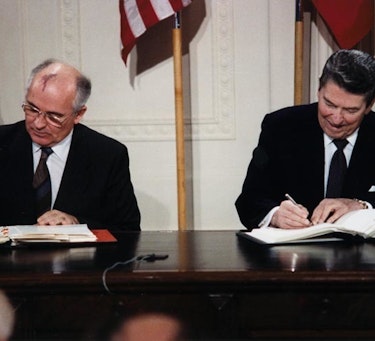Nuclear weapons come first for Russia

Gorbachev and Reagan sign the INF Treaty, 1987.
Foto: Public domainThis week's analysis is written by Pavel K. Baev, Research Professor at PRIO. Pavel writes about the importance of nuclear weapons for Russia, and how they use it as an "instrument of policy". Enjoy the reading!
It came as no surprise at the recent meeting of the UN Security Council on nuclear non-proliferation that the Russian Foreign Minister Sergei Lavrov rejected the Treaty on the Prohibition of Nuclear Weapons. What was perhaps surprising for the growing ranks of supporters of the International Campaign to Abolish Nuclear Weapons (ICAN) was his argument that this Treaty “provokes deep discord” in the international community and could “destabilize” the non-proliferation regime. Such rigid stance is, however, a direct consequence of Russia’s heavy reliance on nuclear weapons for upholding its international status and for putting pressure on the West in the evolving and fluid confrontation.
Russia embarked on the massive modernization of its nuclear arsenal at the start of this decade, and several hugely expensive projects – including the construction of the Borey-class strategic submarines and the resumption of production of Tu-160 bombers – are among the top priorities in the newly-approved 2027 State Armament program. This sustained effort is recognized as a security challenge in the new US National Defense Strategy and the forthcoming US Nuclear Posture Review is set to develop a range of responses to it. This arms race could destroy the remnants of the arms control regime, and the INF Treaty (1988) is under threat of being abandoned already this year.
Russia presents itself as a staunch supporter of the non-proliferation regime, but its policies in the two most contentious nuclear situations are rather ambivalent. Moscow argues against any revisions of the 2015 Joint Comprehensive Plan of Action on the Iranian nuclear program, but Lavrov asserted that without US commitment this deal would collapse. Moscow also backs the termination of nuclear and missile programs in North Korea, but it has done its diplomatic best to soften every UN resolution on sanctions and keeps arguing that the sanctions regime would not work, while exploring various avenues of sabotaging it.
Having invested so much resources in upgrading its nuclear capabilities, Russia is interested in finding opportunities for harvesting political dividends from this investment. It needs to find a way of making nuclear weapons into a usable instrument of policy, and this makes Russia the most “nuclearistic” power in the world.
Further reading:
Pavel K. Baev: Russia is the most nuclearized power in the world
Kelsey Davenport: Nuclear weapons: Who has what at a glance
Hans M. Kristensen: Russian nuclear forces: Buildup or modernization?
Pavel K. Baev is Research Professor at PRIO